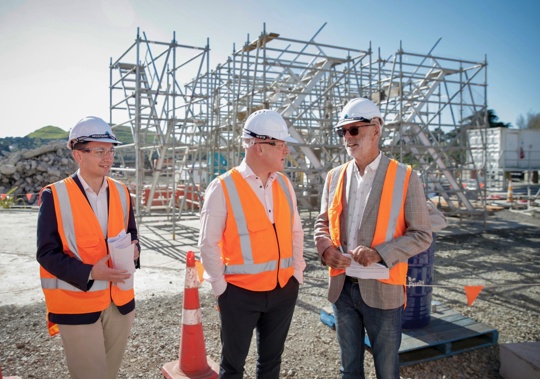
Regional Wellington leadership is showing signs of cautious optimism towards the Government's new water reform - which was unveiled for Auckland's Watercare over the weekend.
The Three Waters co-governance project has been killed under the coalition Government, which yesterday gave insight into its own water reform, Local Water Done Well, to separate council-controlled organisations (CCOs) from their respective councils.
In Watercare's case, it's a deal that saves Aucklanders from a proposed 25.8 per cent rates increase. Watercare will be able to borrow $1.9 billion over the next 10 years for long-term investment in water infrastructure.
Local Government Minister Simeon Brown told Newstalk ZB this morning that the Government would require all councils to put forward their water service delivery plans to outline how they will financially sustainably invest in water.
"That will likely involve councils coming together and forming joint CCOs, which will be able to have financial separation or inter-sustainability to make those investments across New Zealand," he told Hosking.
When asked if councils would willingly come together, Brown said the Government will require them to, but backstops would be put in place for those that will not comply or are not able to.
"We want councils putting forward their solutions instead of Government coming across and saying, 'we're going to have a mega-entity, co-governed, Wellington-knows-best solution to your local challenges'."
However, as pointed out by Labour's Keiran McAnulty, Auckland was never going to be the problem child when it came to water reform. As a uniquely set up council, Auckland has Watercare handling water infrastructure - which made the Government's first win low-hanging fruit.
McAnulty said the difficulties would come across the rest of the country.
"Even where there are CCOs like in Wellington, it hasn't worked, and separating them out from the councils isn't necessarily going to work, and areas where there isn't a CCO, there's no guarantee that everyone is going to benefit from that," he told Canterbury Mornings with John MacDonald.
He said if the reform was voluntary, his concern was around the small rural councils, because "why on earth would anybody voluntarily take on their massive costs and low rate-paying base?".
McAnulty said it wasn't straightforward for councils such as those across Canterbury because of their high levels of debt.

"I want to be really clear, this isn't a crack at the councils, they're doing the best they can in the situation they inherited, that's why we've got to front up to we've got to borrow regardless, why don't we try and make it as cheap as we possibly can."
Mike Mendonca, Porirua City Council’s general manager of infrastructure has now told NewstalkZB Plus the council considers the status quo for water management is unsustainable and that reform is essential. He said Porirua was working closely with nine other councils in the lower half of the North Island to achieve the best outcomes within Local Water Done Well.
ZB Plus asked if Local Water Done Well's approach to Auckland could be replicated in Wellington.
"Detail is very light, but from what we can see balance sheet separation is achieved in Auckland," said Mendonca.
"This is a key aspect for Porirua and in that regard, it appears to be positive."
Mendonca said the council anticipated the Government will announce further legislation shortly around the framework and transitional arrangements for the next steps, which would determine how effective the replication would be.
"Also, it's important to note that the Auckland Watercare model is not the same as the Wellington Water model, so there is likely to be some differences in approach."

Regardless of the model selected, Mendonca said, it was no secret the city had underinvested in water infrastructure, as well as other infrastructure, for decades and will need to pay more in future to catch up and enable growth.
He said this would need to include a mature discussion around water meters to measure water loss and collecting revenue, which has already been signalled in the council's Long-Term Plan.
Mendonca was asked about the Government implementing economic regulation to ensure CCO's outline their price paths and asset management approach.
"The need for this regulator has been telescoped for a few years now to sit alongside Taumata Arowai, this is no surprise within the sector," he told ZB Plus.
"Porirua City Council generally sees the approach as prudent."
Brown said the Government would expect to put in place "sensible regulation" to ensure costs remain within their allocated budgets and prevent councils from overspending on infrastructure and borrowing more than necessary.
"It will mean [the CCOs] will be regulated in similar ways to how electricity distribution countries are regulated, they'll have to outline their price paths and their capital expenditure, their asset management plan," said Brown.
"And as part of that, we're putting a Crown monitor in place straight away for Watercare to make sure there is better oversight over their investment plans and ensure Aucklanders are getting better value for money."
Take your Radio, Podcasts and Music with you









